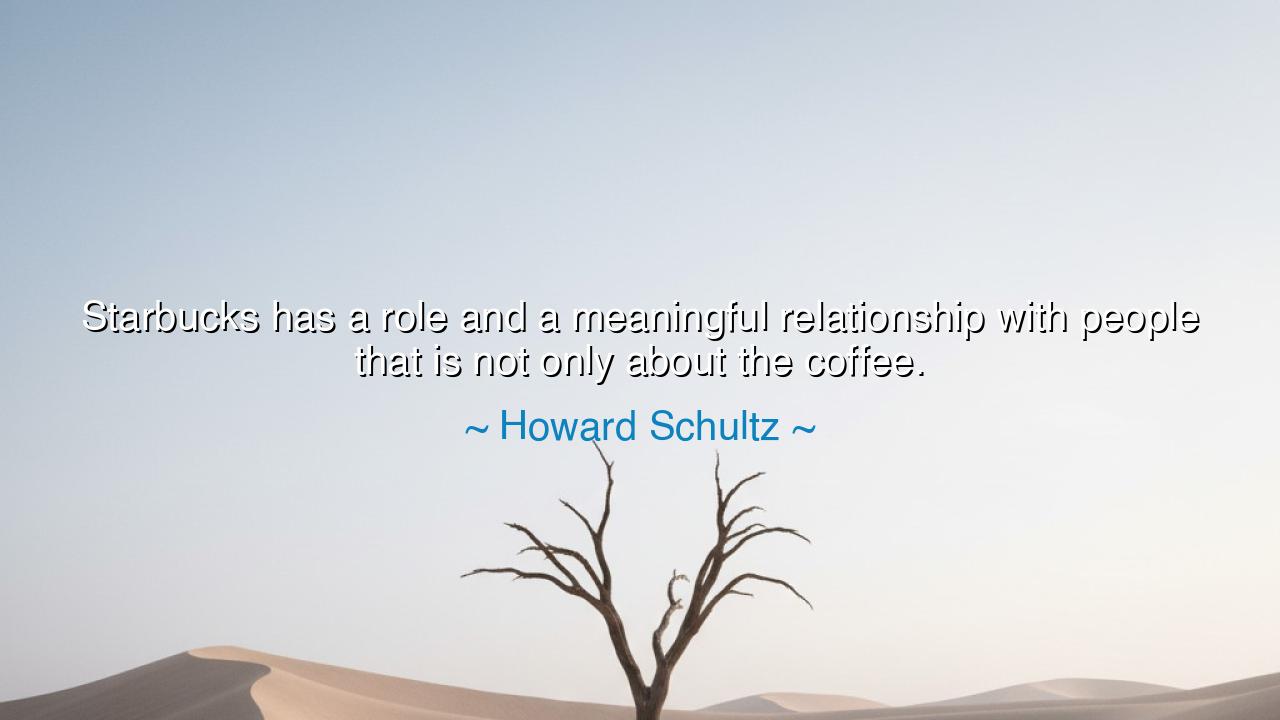
Starbucks has a role and a meaningful relationship with people
Starbucks has a role and a meaningful relationship with people that is not only about the coffee.






Hearken, seekers of understanding, to the words of the modern sage, Howard Schultz: "Starbucks has a role and a meaningful relationship with people that is not only about the coffee." Here lies a teaching of the subtle bonds that connect human hearts to the world of commerce, where a cup becomes more than a vessel—it becomes a bridge between souls. The wise perceive that every gathering, every shared moment, carries within it the essence of connection, transcending the mere objects that bring us together.
Know that in this utterance lies the recognition of purpose. A role is more than function; it is a calling, a promise woven into the daily lives of those it touches. Starbucks, like a temple of modernity, offers not merely coffee, but a space where the weary traveler may find solace, where laughter and conversation may bloom, where the mundane becomes sacred. The wise understand that meaningful relationships can be nurtured even in the hum of everyday rituals.
Yet, consider this also: the value of such a place is not measured solely by its offerings, but by the hearts it touches. The relationship is reciprocal; it is a dance of presence and acknowledgment, where the barista and the patron meet in shared human experience. Howard Schultz’s insight teaches that commerce, when guided by care and intentionality, can become a vessel for community and for the nourishment of the soul as well as the body.
And behold, there is heroism in such understanding. To see beyond the surface, to perceive the deeper connection in ordinary acts, is to wield the wisdom of ages. The cup of coffee becomes a symbol, a talisman of attention, of empathy, of the sacred space between strangers who become companions, if only for a fleeting moment. In these small gestures lies the eternal truth: that life is enriched not by transactions alone, but by the human presence they carry.
Thus, remember, future generations: objects may be many, but the relationships they foster are rare and precious. Schultz’s words echo the ancient teaching that meaning lies not in what is given, but in how it is received, cherished, and shared. A humble café may become a sanctuary, a crucible of connection, reminding us that even in the bustle of the modern world, the human heart remains the center of all that is sacred.
In the end, the ancients would say: attend to the spaces you inhabit, for in them, lives intertwine, and purpose is revealed. Starbucks, in this vision, is more than coffee; it is a living testament to the power of role, of relationship, and of the quiet miracles that unfold when human beings meet in the ordinary, yet extraordinary, moments of life.






NTTruc ly Nguyen Thi
Howard Schultz's comment about Starbucks is powerful because it highlights how businesses can build emotional connections with their customers. But it also raises a question: Can such relationships be truly meaningful when they're based on a transaction? How do we differentiate between authentic relationships and those that are just part of a brand's strategy? Is it possible for brands to genuinely connect with people beyond selling a product?
YXNguyen Yen Xuan
Howard Schultz’s perspective on Starbucks’ role in people’s lives shows how a brand can go beyond its core product and become part of daily routines and personal connections. But I wonder, does this create a sense of dependency on the brand? Do we really need this type of 'meaningful relationship' with a company, or is it something that we’ve been conditioned to value over time through branding?
ᴍᴅᴍøᴄʜɪ ᴅᴇsᴜ
Starbucks being more than just a coffee shop is an intriguing concept. Howard Schultz’s view makes me think about how businesses can create a sense of belonging or purpose in their customers' lives. But does this sense of community come with a cost? How much of our attachment to Starbucks is about the brand’s role in our daily lives, and how much of it is just consumer habit? Can any business replicate this success?
GPGiang Pham
I really resonate with Howard Schultz's idea that Starbucks offers more than just coffee. It’s almost like it’s about creating a space where people can connect, work, or just take a break. But does this shift the perception of what a café should be? Are people coming for the coffee, or are they coming for the experience of the environment? How much do brands need to focus on the experience versus the product itself?
BNTran Nguyen Bao Nhi
Howard Schultz’s statement about Starbucks is interesting because it highlights how the company has built a sense of community beyond just serving coffee. It’s like Starbucks has become a third place between work and home for many people. But how much of this 'meaningful relationship' is genuinely about the experience, and how much is a well-crafted marketing strategy? Can any business truly build such a relationship, or is it only possible for certain brands?